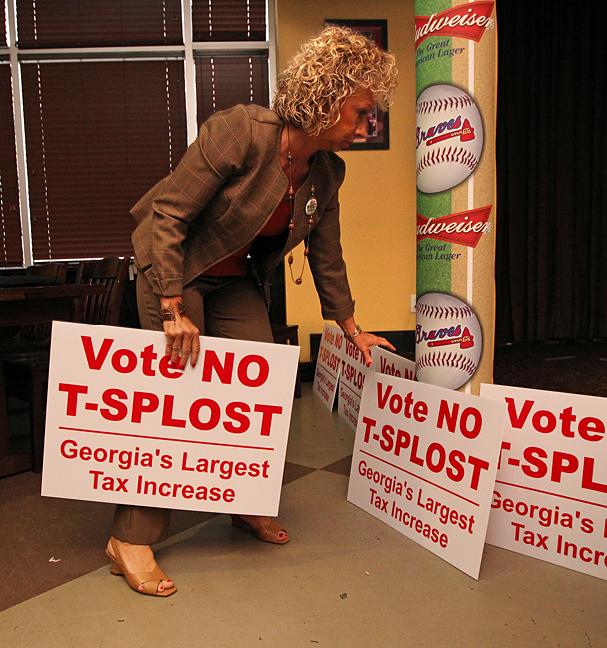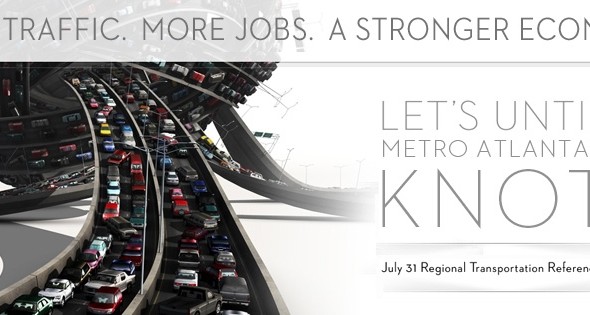
Well, the Atlanta region has spoken.
The proposed one-cent sales tax hike to support $7.15 billion in spending on transit and roads was roundly defeated Tuesday, with 62 percent opposing. Though approved by Atlanta city voters, none of the 10 counties considering the measure gave it the thumbs up, according to unofficial results.
The defeat "leaves the Atlanta region's traffic congestion problem with no visible remedy," wrote Atlanta Journal-Constitution writer Ariel Hart. "It marks [a] failure not only for the tax but for the first attempt ever to unify the 10-county region's disparate voters behind a plan of action."
The immediate implications are huge. The most urgent is the funding situation at MARTA, Atlanta's already threadbare transit system, which sees half a million daily boardings.
MARTA will most likely see fare hikes or service reductions in the next fiscal year, said Ashley Robbins, executive director of Citizens for Progressive Transit, which advocated for the spending package. The region's transit agency, which receives no state support, has been spending down its reserves. Even with the $600 million earmarked for MARTA in the referendum, the agency was still facing a $2.3 billion shortfall over the next 10 years.
In addition, the region's suburban express bus service, GRTA, which serves about 10,000 daily, will most likely be forced to close. And Clayton County, a largely urban county south of Atlanta that lost its transit service altogether two years ago, will have no means to restore service.
And Atlanta can forget about expanding rail service in the short term. By state decree, the entire $600 million for MARTA in the package was for capital needs, not operations, according to a MARTA spokesman. The referendum's failure is a major setback for the Beltline, Atlanta's innovative plan for a greenways and rail corridor that would circle the central city (though the region's downtown streetcar project is moving forward with federal funds).
Georgia Governor Nathan Deal told the AJC this morning that he had no interest in reviving the transportation spending package in any way, although he had campaigned heavily for its passage. He also rejected the idea of seeking new tax revenue elsewhere.
In light of the defeat, Deal said he would focus existing resources toward plans to add an interchange at I-285 and Georgia 400. He said other projects would have to be delayed, and he indicated he was not eager to do anything to shore up MARTA.
"MARTA needs to be fixed, and before the taxpayers are going to spend any more money on MARTA, I think they've also sent a message that they're not going to put more money into something they perceive is not functioning appropriately with the revenue that's available," he said.
With that, it seems the Atlanta region's fate as one of the most congested cities in the country is sealed.
The Georgia Department of Transportation, which ranks 49th nationally in per-capita transportation spending, is mired in debt. Roughly half of Georgia's existing gas tax revenues must be put toward debt service, said Robbins. Without the revenues that would have come from the sales tax, the state may find itself returning federal funds, for lack of a 20 percent match.
"We have no money for roads, no money for trains, no money for anything now," Robbins said.
The Atlanta Journal Constitution called election results a "win for the Tea Party" and a "voter revolt," against a measure that had the enthusiastic support of Atlanta's business community and political establishment.

The Georgia Tea Party's rhetoric about government mistrust seemed to resonate with both urban and rural voters. The AJC interviewed Shirley Tondee, a suburban Republican, who said she thought congestion needed to be addressed, but voted no anyway. "I just don't trust that government is going to take the money and do what they say they're going to do," she said.
Nor could referendum supporters fully marshal the support of urban residents and African-Americans, who may have been among the biggest beneficiaries. The DeKalb County NAACP was of the most strident critics of the plan. In a seemingly political move, on the eve of yesterday's vote, the Georgia NAACP filed a discrimination lawsuit against the Georgia Department of Transportation over a separate matter.
Citizens for Progressive Transportation pointed out today, however, that 59 percent of Atlanta city residents approved the measure, calling it a strong endorsement of the transit portion of the plan, especially the Beltline.
Some observers speculated that the $8 million spent on the campaign for the transportation tax, which used an image of a tangled highway as its logo, was overly focused on courting suburban voters and took for granted that the measure would receive strong support in urban counties.
"The picture [above right] says it all," said Andrew Austin, of Americans for Transit.
But AJC reporter Jill Howard Church, a resident of suburban Fayette County, said the referendum's loss was a "sign of the times," saying the opposition used "a campaign strategy that successfully used the dirty words 'tax' and 'government' to thwart comprehensive public analysis of project benefits."
"In Fayette County, where many folks utter the term 'mass transit' with the same affection as 'child rapist,' reaction to the vote is cause for gloat," she said. But their opposition was short-sighted: "Fayette residents who commute to the airport and northward will remain stuck in the same squeeze onto I-85 or wind through back roads in a desperate attempt to shave a few minutes off the drive."
She added that the vote was a "classic example of being penny wise and pound foolish."
"Maybe it's a sign we're going nowhere."





